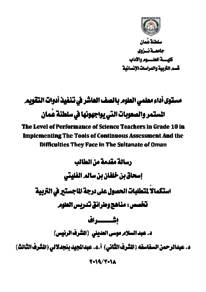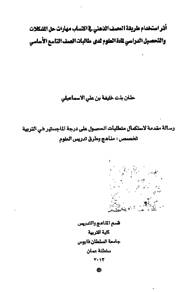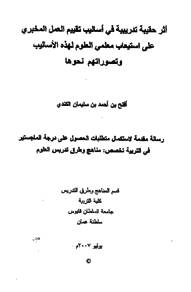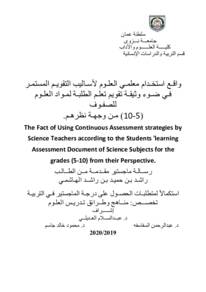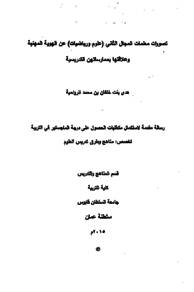Document
معتقدات معلمات العلوم في مدارس الحلقة الثانية من التعليم الأساسي نحو الاستراتيجيات المتناغمة مع مبادئ التعلم المستند إلى الدماغ و علاقتها بالممارسة الصفية
Publisher
جامعة السلطان قابوس
Gregorian
2010
Language
Arabic
Subject
English abstract
This study aims at investigating the beliefs of female science teachers in cycle two basic education schools regarding the strategies associated with principles of Brain Based learning and the relationship of these beliefs with the classroom practices. This study is also concerned to reveal the effect of the two variables, namely teachers preparation institution and the teaching experience, on these beliefs. The sample of the study involved 30 female science teachers in cycle two basic education schools at the academic year 2008/2009 in Al-Batinah South region. To achieve the study aims, the researcher has used two instruments: . Classroom observation checklist: the observation protocol was made of 24 items classified under the 12 principles of brain-based learning. 2. Beliefs scale instrument :made of 36 items under the 12 principles of brain based learning. To enhance the reliability of the observation checklist, it was applied using the test-retest technique on an outside sample, other than the original sample of the study. Kindle correlation coefficient was (0.73). Pearson correlation coefficient was (0.90). To measure the reliability of the beliefs scale instrument, Cronbach alpha coefficient of internal consistency reached (0.90). This means that the two instruments were reliable to be used for the aim of this study. The study results revealed that: The female science teachers belief towards the strategies related to principles of brain-based learning reached mean of (4.24). This shows a strong be these teachers held about the strategies related to brain-based learning. However, there were no statistically significant differences at level (0.05>a) between the means of beliefs of female science teachers using brain-based learning, that might be attributed to the variance in preparation institution and their years of experience. The means of the use strategies related to principles of brain-based learning by female science teachers reached (0.72). This means that the sample of the study practiced the principles of brain-based learning with a high degree. However, there were no statistically significant differences at level (0.05>a) among the means of female science teachers practices using brain-based learning in classroom, that might be attributed to the variance in preparation institution and their years of experience. There was no statistically significant correlation relationship at level (0.05>a) between the beliefs of female science teachers on these strategies and their classroom practices. According to the results of this study, it is recommended that principles of brain based learning are included in teacher preparation programs at the pre-service stage as well as in in-service teacher training programs. More research is also recommended on the same topic,
Description
رسالة جامعية
Member of
Resource URL
Arabic abstract
هدفت هذه الدراسة إلى تقصي معتقدات معلمات العلوم في مدراس الحلقة الثانية من التعليم الأساسي نحو الاستراتيجيات المتناغمة مع مبادئ التعلم المستند إلى الدماغ وعلاقتها بالممارسة الصفية، كما اهتمت أيضا بمعرفة أثر متغيري مؤسسة الإعداد والخبرة التدريسية عليهماء تكونت عينة الدراسة من (۳۰) معلمة علوم بمدارس الحلقة الثانية من التعليم الأساسي بمنطقة الباطنة جلوب للعام الدراسي 2004/2008 م، ولتحقيق أهداف الدراسة قامت الباحثة بإعداد أداتين هما: أولا: بطاقة ملاحظة، تكونت من (۲۶) بندا (ممارسة موزعة على (۱۲) مبدأ من مبادئ التعلم المستند إلى الدماغ ثانيا: مقیاس معتقدات، تكون من (۳۹) عبارة موزعة على (۱۲) مبدأ من مبادئ التعلم المستند إلى الدماغ. وقد جرى حساب ثبات بطاقة الملاحظة من خلال تطبيقها على عينة خارج العينة الأصلية، حيث بلغ معامل كيندال للاتفاق بين الملاحظين (۰٫۷۳)، وتم حساب معامل ارتباط بيرسون بين ملاحظات الاثنين ووجد أنه يساوي (0٫۹۰)، كما جرى حساب ثبات الاتساق الداخلي لمقياس المعتقدات باستخدام معامل ثبات کرونباخ ألفا، حيث بلغ (۱۹۰)، مما يعد مؤشرا على أن الأداتين صالحتين لأهداف الدراسة. وقد أشارت نتائج الدراسة إلى الأتي : . أن متوسط معتقدات معلمات العلوم نحو الاستراتيجيات المتناغمة مع مبادئ التعلم المستند إلى الدماغ بلغ (4.24)، مما يعبر عن اعتقاد قوي لدى المعلمات - عينة الدراسة نحو الاستراتيجيات المتناغمة مع مبادئ التعلم المستند إلى الدماغ، بينما لم تكن هناك فروق دالة إحصائيا عند مستوى دلالة (ه د ۰٫۰۵) بين متوسطات معتقدات معلمات العلوم نحو الاستراتيجيات المتناغمة مع مبادئ التعلم المستند إلى الدماغ يعزي لمتغير مؤسسة الإعداد ومتغير الخبرة. . أن متوسط ممارسة معلمات العلوم للاستراتيجيات المتناغمة مع مبادئ التعلم المستند إلى الدماغ داخل الغرفة الصفية بلغ (۰٫۷۲)، مما يدل على أن أفراد عينة الدراسة يمارسن الاستراتيجيات المتناغمة م ع مبادئ التعلم المستند إلى الدماغ داخل الغرفة الصفية بدرجة عالية، بينما لم تكن هناك فروق دالة إحصائية عند مستوى دلالة (ه 0٫05) بين متوسطات ممارسة معلمات العلوم للاستراتيجيات المتناغمة مع مبادئ التعلم المستند إلى الدماغ داخل الغرفة الصفية يعزي لمتغير مؤسسة الإعداد ومتغير الخبرة. عدم وجود علاقة ارتباطيه دالة إحصائيا عند مستوى دلالة (0.05)) بين معتقدات معلمات العلوم نحو تلك الاستراتيجيات وممارساتهن الصفية. هذا وقد أوصت الدراسة في ضوء ما أسفرت عنه تلك النتائج إلى أهمية تضمين مبادئ التعلم المستند إلى الدماغ في برامج إعداد المعلم قبل وأثناء الخدمة، وإجراء مزيدا من الدراسات حول موضوع مبادئ التعلم المستند إلى الدماغ
Category
Theses and Dissertations


